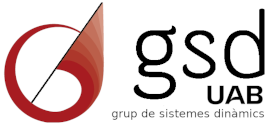Our current research focuses on three main areas: Qualitative Theory of Differential Equations, Discrete Dynamical Systems, and Celestial Mechanics.
- Qualitative Theory of Differential Equations: Over the years, we have explored a wide range of problems within the qualitative theory of differential equations. Recently, our primary interest has shifted towards the well-known 16th Hilbert Problem and the Jacobian Conjecture. Our work includes investigations into the Markus-Yamabe conjecture, cyclicity and criticality problems, the center-focus problem, Hamiltonian perturbations, Abelian integrals, isochronicity, and the uniqueness of limit cycles. We are also engaged in other topics such as the general theory of polynomial differential systems, control theory, the study of singularities via blow-ups, non-differentiable dynamical systems, structural stability, and quadratic polynomial systems.
- Discrete Dynamical Systems: Our research primarily centers on the dynamics of continuous maps on one-dimensional topological spaces. Key areas of interest include periodic structures, combinatorial dynamics, topological dynamics, topological entropy, and complex dynamics. In specific cases, including higher-dimensional spaces, we employ the general theories of Lefschetz and Nielsen when examining periodic structures. Additionally, we study minimal dynamics within a homotopy class. For more information about our recent work in complex dynamics, please refer to its research team page.
- Celestial Mechanics: Our main objective is to describe the global flow for certain restricted three-body problems using symbolic dynamics, with a particular emphasis on dynamics near homoclinic and heteroclinic orbits. We also investigate the number and distribution of central configurations in the n-body problem, utilizing this information to further explore the dynamics and global flow associated with n-body systems.
For a list of our main collaborators, please visit the co-authors page.
